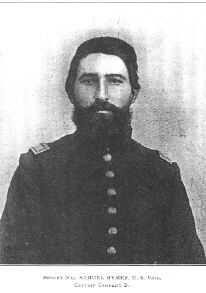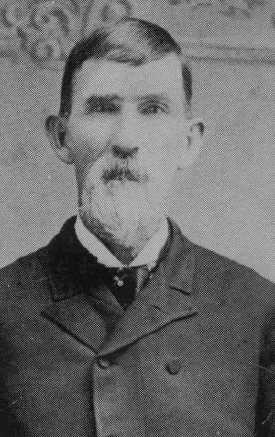
 |
||
 |
Captain/Brevet Major Samuel Hymer Company D, 115th Illinois Volunteer Infantry |
 |
 |
||
  |
||
|
See Major Hymer's account of the Battle of Buzzard Roost Gap below. SAMUEL HYMER, Brevet Major, the second captain of Company D, was born in Harrison County, Ind., on May 17, 1829, and removed with his father's family to Schuyler County, Ill., in 1837, where he resided on a farm until he entered the service. His education was such as the district schools afforded and supplemented by brief terms in the Rushville schools. At the organization of Company D he was chosen second lieutenant very unexpectedly to himself, and on the resignation of Lieutenant Bridgewater, May 28,1863, he was advanced to the first lieutenancy, and on the death of Captain Huckstep, December 9, 1863, he was promoted to the captaincy of his company. As first lieutenant he commanded his company after the wounding of Captain Huckstep, and did valiant service throughout the battle of Chickamauga. During the siege of Chattanooga Captain Hymer's company occupied a position above Brown's Ferry, where it remained several weeks without tents and with not more than half a dozen blankets to the company, constantly watching the operations of the rebels on Lookout Mountain. Though always an efficient officer and faithful in every duty, the crowning glory of Major Hymer's service was the defense of the blockhouse at Buzzard Roost Gap, which has been given at length in its proper place in this history. For this splendid service, the President gave him the brevet rank of major and as further mark of distinction Congress conferred upon him a medal of honor "for most distinguished gallantry in action at Buzzard Roost Gap, Ga., October 13, 1864." In transmitting the award the secretary of war uses the following language: "This officer, with only fortv-one men under his command, defended and held a blockhouse against the attack of Hood's army for nearly ten hours, thus checking the advance of the enemy and insuring the safety of the rest of his regiment, as well as that of the 8th Kentucky Infantry, then stationed at Ringgold, Georgia." Major Hymer's experience while a prisoner was much the same as other Union officers in similar circumstances. He was taken with his company after the capture to Jacksonville, Ala., then to Selma, then to Montgomery, and thence to Macon, Ga. Here five of them, including the major, escaped, but he was soon captured and returned to the stockade. The major's experience in his journeys from place to place, and the many incidents of his prison life would fill a volume, but want of space prevents giving them here. He was finally paroled and sent into our lines at Wilmington, N. C., and was thence taken to Annapolis, Md., by steamer and thence taken to his home in Schuyler County, Ill., by railroad, and was discharged May 15, 1865. In 1866 he removed to Miami County, Kan., and engaged in farming and stock raising. He soon took interest in politics, and served as township assessor, a member of the Kansas legislature, town treasurer, and director of city schools. In 1882 he removed to La Cygne, Lynn county, Kansas, where he resides, and is an honored citizen. For many years he has been a local preacher in the Methodist Episcopal Church. Source: History of 115th Reg ILL Vol. Infantry Brevet Major Samuel Hymer Comments Co. D 115th Illinois Infantry On the 13th of October Hood reached Dalton, capturing its colored garrison without resistance, and at once moved up the valley and demanded the surrender of Company D’s blockhouse. Captain Hymer thus describes their approach and the result: "I had received orders to hold the gap and not surrender to any force. In anticipation of such an attack we had been supplied with plenty of rations and ammunition, and a large tank inside the blockhouse was constantly kept filled with fresh water. General Bate led the advance and appeared before us at 1p. m. on the 13th of October. His adjutant- general, Captain Carter, appeared on the mountainside with a flag of truce, but not recognizing its character I shot his horse from under him. Soon they brought up a battery of brass field guns and opened on the blockhouse with great fury, with both artillery and musketry. I at once placed my men, one-half at the port holes and the other half serving them with loaded guns. This soon silenced their guns, but they quickly opened again in a less exposed position. In the mean- time the rebel infantry had passed over the spurs of the mountain, and had us completely surrounded. By three o'clock no less than 6,000 infantry and a battery were pouring shot and shell into the blockhouse. Thus the battle raged all that afternoon and evening. Now a man falls, then another, but the brave boys of Company D stand to their port holes, picking off the rebels in large numbers with their trusty rifles. As night came on the surrounding hills were lighted by the rebel camp fires. Finally the firing ceased and I looked at the result of the battle. Five of my men were dead and nearly all the rest more or less wounded. The blockhouse was torn to slivers, and the earth covering pouring in upon us. All was then still as the grave excepting the groans of the wounded. I decided to await results. We were done fighting, but we had held the entire rebel army more than ten hours, had enabled Sherman to make ten hours' gain on the enemy, and had saved our regiment at Tunnel Hill. I then placed all my men, that were still able, at the four sides of the ruined blockhouse to watch for an assault. Very soon I saw a flag shaking over the railroad grade ten steps away. To our challenge, the reply came, 'A flag of truce'. I then went out and found it was Captain Carter of General Bate's staff. He came up on the grade saying, 'I was afraid to be seen, as you have shot at everything in sight. This is the third time I have tried to come to you with a flag of truce. He then presented to me the following demand: In the field near Dalton, Ga., October 13, 1864. I am commanded by Major-General Bate, C.S.A., to demand the surrender of this fort and garrison. Your officers and men will be treated as prisoners of war. Your defense has been gallant, and any further resistance will be an unnecessary effusion of blood. Theo. Carter, Captain C. S. A. "Upon this I endorsed mv acceptance as follows: "I told Captain Carter his men must not enter the blockhouse until we had time to pack up and march out. We spent a half hour putting on our best clothes, packing up our valuables and throwing guns and ammunition in the creek in the rear. We then marched out in line. 'Is that all the men you have?' said the officer, to which I replied, 'No, there are five dead, and twice that number wounded still in the fort'. He exclaimed, 'Oh, we thought there were two or three companies'." Soon after the regiment came to Tunnel Hill in July 1864, Co. D was assigned to guard a bridge at Buzzard Roost Gap, a little more than half way from Tunnel Hill to Dalton. At that time there were no fortifications in the place and the company was kept busy for some time making log breastworks for their defence. In August a company of engineers arrived and with the aid of Company D built a very substantial blockhouse. The company occupied a row of tents on the bank of the creek near the blockhouse, being ready to enter that stronghold in case of need. The company had three miles of railroad to patrol and keep open, which, with other duties, kept them very busy day and night. Frequent raids were made by Confederate cavalry and the company occasionally had slight skirmishes with them, without loss, however. On one occasion a horse was killed and its rebel rider severely wounded. General Wheeler came in the valley some time in September with quite a force of cavalry and attacked Dalton, but the garrison, making stout defence, held them in check until the arrival of General Steedman with a force from Chattanooga. After General Hood left Atlanta on his raid on the North the country about Buzzard Roost was constantly filled with rebel scouts so that we were compelled to be always on the alert expecting an attack. As my account of Hood's attack on our blockhouse is given in substance in the body of the history, it is not necessary to repeat it here, but an incident is worth mentioning. Squire Bechtol of Company D was illiterate, but proved to be the smartest man in the company. When the blockhouse was captured he lay on the ground groaning and appearing to be badly wounded, and would not let anyone touch him, so he was left there with the wounded and after the rebels were gone with the prisoners, he managed to come to, having only feigned injury. After the surrender we were taken to General Bate's head- quarters, where we were asked many questions. The next morning after the capture a detail from Company D buried the dead. The wounded were taken to a house nearby and left there to make the most of their condition, while the rebel army moved on. We were fairly well treated by our captors and recognition made of our gallant defense, being permitted to retain our side arms and most of our personal effects. The company went on a tour through the Confederacy, via Selma and Montgomery, Ala., to Millen, where Lieutenant Jones and myself were separated from the enlisted men. By special exchange fifteen of the men were sent North and the others left to take their chances in Andersonville and other prisons. Lieutenant Jones and I, with other officers were sent to Camp Sorghum, near Columbia, SC. There we met Captain Hanon and Lieutenant Gore of Company A. As Sherman approached we were taken to Charlotte, North Carolina, seventy-five men being put in each box-car. At Charlotte many prisoners made their escape, the guards not being any longer careful to prevent it. I preferred to wait a little longer and be exchanged, which occurred soon after, and Lieutenant Jones and I came to Annapolis, Md. After a visit home we were ordered to Benton's Barracks, near St. Louis, where we met the remnant of Company D, which had been exchanged at Vicksburg, and were soon after discharged. |
Submitted by William Baran
For corrections or additions, please contact Special Project Coordinator:
Kimberly
Morgan
Last Edited: 15 Mar 2025